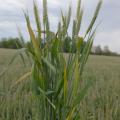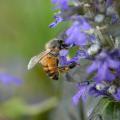News From 2007
MISSISSIPPI STATE -- Each morning Carl Blair, like many people, checks the weather, but his interest in the weather is part of a tradition that goes back 125 years.
Blair is an equipment operator for the Mississippi Agricultural and Forestry Experiment Station at Mississippi State University and his duties include recording data collected by National Weather Service equipment located on campus.
MISSISSIPPI STATE -- Mississippi's 2006 timber harvest value declined almost 17 percent from the previous year, and industry watchers do not expect much improvement in 2007.
Glenn Hughes, a forestry professor with Mississippi State University's Extension Service, said a significant amount of Hurricane Katrina-damaged timber remains in storage -- wet-decked -- in lumber yards awaiting use.
MISSISSIPPI STATE -- A new reality show will help Mississippi's 3- and 4-year-old children prepare for their first day of school.
Mississippi State University's Extension Service is tapping into the latest media trend by providing a unique glimpse into an accredited classroom and training child-care providers to prepare preschoolers for kindergarten. They are demonstrating that some reality shows are not only entertaining, they also can be educational.
MISSISSIPPI STATE -- Camping often brings people closer to nature, but Mississippi State University is also offering the opportunity to learn about wildlife, fisheries and the great outdoors to parents, teachers and children as young as 10.
Two camps will be offered this summer: June 3-7 and July 8-12. The cost for each camp is $225 per person and includes on-campus lodging, meals, field trip transportation and a camp T-shirt. During the week, participants will eat a wildlife meal after receiving tips on cooking game.
By Norman Winter
MSU Horticulturist
Central Mississippi Research & Extension Center
Periwinkle planting time is here, and you have got to try the 2007 Mississippi Medallion award-winning Titans. The Titan periwinkles really live up to the name in vigor and performance.
The botanical name of periwinkles is Catharanthus, which means pure and without blemish. That is how you will feel about the Titan series. You may remember them as Vinca rosea, but the official name is Catharanthus roseus.
By Robert H. Wells
Delta Research and Extension Center
STONEVILLE -- A Delta researcher is using new biological control technology to combat reniform nematodes, underground worms that cause Mississippi cotton producers losses of $30 million annually.
MISSISSIPPI STATE -- High fuel prices give many people a reason to complain, but they also may drive the resurgence of an industry that was big business in Mississippi 100 years ago.
David Nagel, vegetable specialist with the Mississippi State University Extension Service, said fuel prices have made it more difficult for vegetable growers on the West Coast to ship produce across the country and still make a profit.
MISSISSIPPI STATE -- Poultry companies are facing significantly higher production costs in 2007 as corn prices remain at historic levels without much relief in sight.
John Anderson, agricultural economist with Mississippi State University's Extension Service, said corn prices are about $1.25 per bushel higher than a year ago.
MISSISSIPPI STATE -- A job that seems secure one day can be gone the next, leaving those without an income struggling unless preparations were made before the job loss.
In West Point, the Bryan Foods plant closed at the end of March, putting more than 1,600 people out of work. In nearly every community across Mississippi, some people lose their jobs almost every week.
Bobbie Shaffett, family resource management specialist with the Mississippi State University Extension Service, said a savings is the best defense against financial ruin.
By Norman Winter
MSU Horticulturist
Central Mississippi Research & Extension Center
Blue is one of the colors that catches your eye when used in the garden and is a color we all treasure.
MISSISSIPPI STATE -- Many Mississippi fruit and nut growers are waiting to see what impact Easter weekend's freezing temperatures had on their crops.
Blueberries and pecans were at a vulnerable stage when temperatures dropped the first weekend in April. Strawberries were already being harvested and were mostly unharmed, and the new growth on muscadine grapes appears unhindered by the cold.
MISSISSIPPI STATE -- Local economic development officials, a Mississippi State University team and railroad owners are working to revive a 92-mile section of tracks linking the Delta and the eastern part of the state.
By Norman Winter
MSU Horticulturist
Central Mississippi Research & Extension Center
Irises are among the most versatile plants for the North American landscape. They are prized for both flower and foliage.
Mention iris, and the first one that comes to mind is the bearded iris. The spring bloom of the bearded iris is a site to behold because of the size and shape of the bloom and its deeply saturated colors.
MISSISSIPPI STATE -- Mississippi's hog producers are finding ways to stay in business despite the major blow dealt by the March 30 closing of Bryan Foods' West Point plant.
The Sara Lee Corp. decision to close the meat-processing plant caused the state's swine industry to scramble to find new markets and a new direction. Mark Crenshaw, swine specialist with the Mississippi State University Extension Service, said the closing has a devastating impact on the swine industry in Mississippi and surrounding states.
MISSISSIPPI STATE -- Mississippi's wheat that thrived in March's balmy weather experienced major damage during two nights of freezing temperatures over the Easter weekend.
Erick Larson, small grains specialist with Mississippi State University's Extension Service, said the early warm temperatures had advanced the maturity of the crop and made it more vulnerable to the freeze. Wheat was about two weeks ahead of schedule.
MISSISSIPPI STATE -- A one-day workshop for farmers, landowners and resource managers will provide the tools to start and manage a natural resource enterprise.
Fee fishing, fee hunting, agritourism, and wildlife watching are examples of enterprises based on the natural resources commonly found on Mississippi private lands.
MISSISSIPPI STATE -- Organized 38 years ago to encourage youth to become involved in exhibiting livestock, the Dixie National Sale of Junior Champions still meets that goal and much more.
R.O. Buckley of Starkville said magnificent animals, hard-working youth and generous buyers are the key components in one of the best youth livestock sales in the country.
By Norman Winter
MSU Horticulturist
Central Mississippi Research & Extension Center
It's hard to believe that a native, spring-blooming tree can be so passionately loved from the Gulf Coast all the way to Pennsylvania and New York, but that is how people feel for the Grancy Graybeard.
They are known as Old Man's Beard or white fringe tree in some areas. It is in glorious bloom now in the lower South and as spring arrives further north, it will bring joy throughout the rest of the states.
MISSISSIPPI STATE -- Mississippi cotton growers may have fewer acres to plant, but not necessarily fewer challenges in 2007.
While environmental conditions will be the biggest factor, the boom in corn acreage may increase certain insect pressure in Mississippi's cotton.
Angus Catchot, entomologist with Mississippi State University's Extension Service, said corn is one of the primary hosts for bollworms, which edged out tarnished plant bugs as the state's No. 1 cotton pest last year.
MISSISSIPPI STATE -- An unknown enemy is destroying honey bee colonies across the nation, and researchers are scrambling to discover what is causing it and how it can be prevented.
The problem is being called colony collapse disorder, and it was identified in late 2006. Hives with the disorder go from a robust colony with a large adult bee population to an empty hive with the queen and brood abandoned in the space of a few weeks.
Pages
News Types
- Crop Report (428)
- Feature Story (5905)
- Feature Photo (53)
- Extension Outdoors (320)
- Southern Gardening (1481)
- Extension Inbox (95)
Archive
- 2025 (98)
- 2024 (186)
- 2023 (182)
- 2022 (183)
- 2021 (176)
- 2020 (211)
- 2019 (222)
- 2018 (276)
- 2017 (336)
- 2016 (381)
- 2015 (456)
- 2014 (495)
- 2013 (487)
- 2012 (491)
- 2011 (354)
- 2010 (320)
- 2009 (313)
- 2008 (272)
- 2007 (263)
- 2006 (252)
- 2005 (278)
- 2004 (270)
- 2003 (279)
- 2002 (227)
- 2001 (238)
- 2000 (241)
- 1999 (231)
- 1998 (231)
- 1997 (239)
- 1996 (58)
- 1995 (36)











